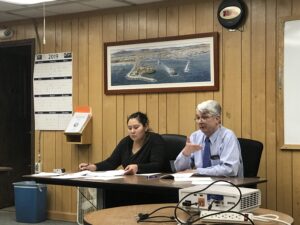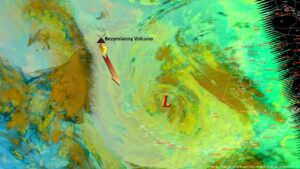Crowds of people have taken to the streets across the world to protest police brutality and institutionalized racism against Black Americans. Last week that movement also hit the shores of the Norton Sound in Unalakleet.
KNOM’s Emily Hofstaedter spoke with one student organizer who chose to publicly say that “Black Lives Matter”, rather than stay silent.
16-year-old Olivia Mashiana of Unalakleet and another teenage friend sat in her living room scrolling through the news on Tuesday night. Mashiana comes from a multi-racial family and she herself is white and Indian; her friend is Black and Alaska Native. Despite a very small Black population in Unalakleet, the issues of police violence and discrimination still felt close to home.
“I know I myself have seen prejudice against people of color. I just wanted my sisters and my friend and my dad to know that I’m standing right here beside them and they don’t have to walk by themselves and I stand behind them 100%.”
– Olivia Mashiana
The planning to hold a Black Lives Matter march in Unalakleet was quick and organic. As they read news of protests happening around the world, Kristen Mashiana, Olivia’s mom, saw the girls spring into action.
“And it was like instantly, mom do we have paper? Mom do we have this? And I started gathering stuff and I really didn’t do much with it. They did it.”
On Wednesday [June 3rd], the night of the local Black Lives Matter march, about 15 people stood outside the Mashianas’ home, all ready to march in solidarity down the streets of Unalakleet.
But Olivia Mashiana’s friend and co-organizer couldn’t go. Olivia’s mother Kristen, who is white, remembers that moment.
“Right before they were going to do the walk her friend called and said, ‘I’m not allowed to do it. Her mom was uncomfortable with her doing it. And Olivia looked at me and said, ‘Then I’m walking alone Ma’.”
The Unalakleet demonstration of solidarity garnered just under 20 people. They bore signs saying “Black Lives Matter”, “Justice 4 All” and “I can’t breathe”, a reference to George Floyd’s last words. Floyd was a Black man who was pronounced dead at the hospital after a white police officer in Minneapolis knelt on his neck for almost nine minutes to restrain him.

Unalakleet doesn’t have a large police presence, just a state trooper outpost and a Village Public Safety Officer. There were no reported conflicts between local law enforcement and demonstrators in the Norton Sound town, which other communities around the country have reported.
Unalakleet’s small march was diverse. One marcher was Tricia Ivanoff, who is Inupiaq and Yup’ik. Even though she didn’t expect somewhere as remote as Unalakleet, Alaska to get any widespread attention she still thought it was imperative to stand in solidarity with the Black community.
“You know in our Indigenous cultures, we’ve long known that we are all connected to one another, even to the land. And so, when one part of us suffers it impacts our community, even though we are miles and miles away it impacts our community. We [Alaska Natives] as a community, we have experienced pain, we have experienced trauma. And so we would want others to come out and support our causes and our lives.”
And while she is clear that the urgency of this moment is solidarity for Black Americans, Ivanoff acknowledges the similar challenges Alaska Natives face with police brutality and institutionalized racism. Data from the U.S. Census and the state Department of Corrections show that Alaska Native people make up about 15% of the general population of Alaska yet 37% of the incarcerated population.
One study shows Alaska Native/American Indian men are 1.2-1.7 times more likely to die in an officer-related incident than white men. Her own cousin, Sonja Ivanoff, was murdered by a Nome police officer in 2003.
The Unalakleet teenager and march organizer, Olivia Mashiana, lost the use of her legs in late 2019. Her mother Kristen says she is now learning to walk again with the help of a leg-brace.
“That way more than she’s walked in a long, long time.”
The group wound their way over a mile across Unalakleet, through Main Street, down to the beach, and then back into town.

And galvanized with the support of friends, Mashiana finished most of the walk. She says the response to the local demonstration has been largely positive.
“I didn’t want to worry what other people were thinking. I know that there are people that disagree with me that live in this community. I know there are people that think I was too young to put my voice out there.”
The negativity mostly came afterwards, through social media. Some accused the teenager of letting herself be used as a “puppet in a political movement.”
Mashiana and her mom have been moderating and responding to those negative comments together, using them to be educational about racism and police violence.
Image at top: Unalakleet residents march in solidarity with the Black Lives Matter movement. Photo from Kristen Mashiana, used with permission (2020).





